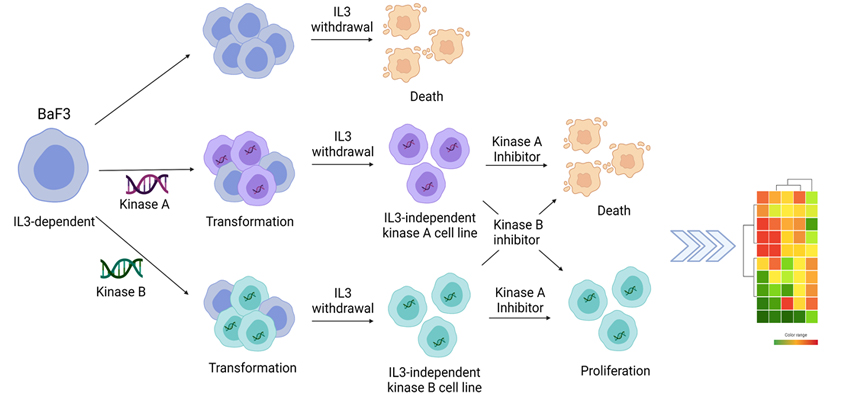HOME / SCIENCE / Platforms
Platforms
Platform technology : TxLFinder™ / TxTQuantifier™

Tumor is not a collection of simple cancerous cells, but rather a complex tissue composed of various types of cells under unique tumor microenvironment (TME). As our understanding of cancer is deepen, it becomes clear that interrogating cancer cell alone is not enough to fully understand various interactions between tumor cells and other types of cells in TME ( for example, an immunosuppressive environment established by tumor cells and immune cells). There has been steady progress in improving ex vivo cell culture system to mimic the TME in order to test various treatment moieties. However, it is remaining as a major hurdle to design an assay system that is 1) manageable enough to perform in conventional cell culture facility and 2) types of cells using and 3) flexible enough to test both human and mouse cell types.
In Txinno Bioscience, we developed two platform technologies to address these issues and facilitate our drug development process.
1) TxLFinder™ that can cultivate cancer cell spheroid and immune cells
from PBMC in separate compartments of microplate wells. With immune cells appropriately stained for
detection, the effect of drug treatment on infiltration of immune cells toward the spheroid can be
measured.
2) TxTQuantifier™ is a co-culture system that are composed of spheroid
from cancer cell line, isolated human immune cells, cancer-associated fibroblast, adipocytes and fabricated
extracellular matrix to closely mimic actual human TME.
TxLFinder™ by Txinno Bioscience can be a highly useful ex vivo culture system to measure the infiltration of immune by innate immune modulator reflecting conversion of TIL-deficient “cold tumor” to TIL-proficient “hot tumor” and to access the efficacy of IO drugs of various mode of action.
TxTQuantifier™ developed by Txinno Bioscience can be used to test various anti-cancer therapeutics, including chemical compound, biologics as well as cell therapy. Also, the system can be used to perform various genetic screening using genomic reagents, like CRISPR, to find the next generation cancer targets.
TxLFinder™ / TxTQuantifier™ with human-derived cancer cells and immune cells (Version 1) was upgraded into a system can culture spheroid of cancer cells and CAF (cancer-associated fibroblast) with immune cells (Version 2). For next step, we are developing a co-culture system with cancer cells, CAFs, endothelial cells and extracellular matrix (Version 3), which closely mimic actual tumor microenvironment (TME) of patient tumors.

Platform technology:
TxBProfiler™

In vitro kinase assay using purified enzyme played a fundamental role in developing variety of different kinase inhibitors for many years. Although testing inhibitor compound in this assay is usually robust depending on the assay conditions, it has obvious limitations that are difficult to improve; 1) activity of inhibitor is likely over-estimated because ATP concentration used in assay is lower than the one inside the cells (millimolar range), 2) it is not trivial to purify recombinant protein to have properties, like post-translational modification and so on, that are close to the enzyme produced inside the cells.
TxBProfiler™ has been constructed to overcome these limitations by conferring IL3-independent growth of Ba/F3 cells that are solely dependent on ectopically expressed, single protein kinase gene. By measuring growth inhibition when expressed kinase is inhibited by compound, the activity of inhibitor can be estimated inside the cells.
At Txinno Bioscience, Ba/F3 cell line library of 50 different kinases has been acquired and we are generating additional Ba/F3 cell lines for new target proteins (protein kinases or RAS protein) of interest to facilitate drug discovery.
Platform technology : TxBProfiler™

The human proteome comprises approximately 20,000 proteins, and dysregulation—such as aberrant post-translational modifications or pathological overexpression—can lead to disease. To maintain protein homeostasis, cells employ highly coordinated protein quality-control mechanisms that selectively tag dysfunctional or superfluous proteins for degradation.
Conventional targeted therapies primarily function by binding to pathogenic proteins to modulate or inhibit their activity. In contrast, Targeted Protein Degradation (TPD) technologies eliminate the disease-causing protein altogether by leveraging the cell’s endogenous degradation machinery. One such modality, PROteolysis-TArgeting Chimeras (PROTACs), exploits the ubiquitin–proteasome system (UPS) to induce ubiquitination and subsequent proteasomal degradation of specific target proteins.
PROTAC offers several advantages, including the ability to address previously “undruggable” targets, achievement of complete target protein ablation, and reduced dosing requirements compared with conventional inhibitors, thereby lowering the likelihood of dose-related toxicities.
Txinno Bioscience has established an AI-enabled PROTAC discovery platform, TxPChider™, designed to accelerate therapeutic development against traditionally undruggable proteins. By integrating computational identification of optimal warheads, linker architectures, and E3 ligase binders to predict and optimize PROTAC-like molecular entities, TxPChider™ enables efficient development of PROTAC therapeutics.
